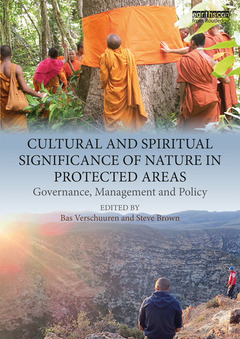Cultural and Spiritual Significance of Nature in Protected Areas Governance, Management and Policy

Cultural and spiritual bonds with ?nature? are among the strongest motivators for nature conservation; yet they are seldom taken into account in the governance and management of protected and conserved areas. The starting point of this book is that to be sustainable, effective, and equitable, approaches to the management and governance of these areas need to engage with people?s deeply held cultural, spiritual, personal, and community values, alongside inspiring action to conserve biological, geological, and cultural diversity.
Since protected area management and governance have traditionally been based on scientific research, a combination of science and spirituality can engage and empower a variety of stakeholders from different cultural and religious backgrounds. As evidenced in this volume, stakeholders range from indigenous peoples and local communities to those following mainstream religions and those representing the wider public. The authors argue that the scope of protected area management and governance needs to be extended to acknowledge the rights, responsibilities, obligations, and aspirations of stakeholder groups and to recognise the cultural and spiritual significance that ?nature? holds for people.
The book also has direct practical applications. These follow the IUCN Best Practice Guidelines for protected and conserved area managers and present a wide range of case studies from around the world, including Africa, Asia, Australia, Europe, and the Americas.
1. Cultural and Spiritual Significance of Nature in Protected and Conserved Areas: The 'deeply seated bond' PART I: CONCEPTS 2. Implications of the Diversity of Concepts and Values of Nature in the Management and Governance of Protected and Conserved Areas 3. Meaningful Nature Experiences: Pathways for deepening connections between people and place 4. Mainstream Faith Participation in Protected and Conserved Areas 5. Spiritual Governance as an Indigenous Behavioural Practice: Implications for protected and conserved areas 6. Exploring the Usefulness of Nature/Culture Convergences in World Heritage: The case of authenticity 7. Buddhism and the Management of Sacred Sites for Biodiversity 8. The Significance of Indigenous Nature Spirituality 9. The Cultural and Spiritual Significance of Nature: Involving the general public in the management and governance of protected areas PART II: POLICY AND PRACTICE 10. Connecting Practice: Defining new methods and strategies to further integrate natural and cultural heritage under the World Heritage Convention 11. Entangled Landscapes: Connecting conservation practices for naturecultures in the Mongolian Altai 12. Culture and Nature: The case of the RamsarConvention on wetlands 13. Developing Guidelines for Integrating Cultural and Spiritual Values into the Protected Areas of Spain 14. Managing Religious Pilgrimage to Sacred Sites in Indian Protected Areas PART III: CASE STUDIES 15. China’s Community Fengshui Forests: Spiritual ecology and nature conservation 16. Father Forest: Batwa culture and the management of national parks in Uganda’s Albertine Rift 17. Kaio, kapwier, nepek,and nuk: Human and non-human agency and 'conservation' on Tanna, Vanuatu 18. Exploring Spiritual and Religious Values in Landscapes of Production: Lessons and examples from Italy 19. The Nature of Attachment: An Australian experience 20. Reflections on the Situational and Relational Contexts of Nature in Protected and Conserved Areas
Bas Verschuuren is a freelance biocultural adviser and associate researcher at the Department of Sociology of Development and Change at Wageningen University, the Netherlands. He combines his experience in conservation projects with applied research on the cultural, spiritual, and sacred dimensions of nature in management and policy.
Steve Brown is an honorary associate with the Museum and Heritage Studies Program at the University of Sydney, Australia. His research interests include: conceptualising and operationalising place-attachment in heritage theory and practice; the integration of naturecultures in the heritage management of protected areas; and the material culture of domestic homes and gardens.
Date de parution : 08-2018
17.4x24.6 cm
Date de parution : 08-2018
17.4x24.6 cm
Thème de Cultural and Spiritual Significance of Nature in... :
Mots-clés :
Sacred Natural Sites; sacred; Indigenous And Community Conserved Area; natural; Mongolian Altai; sites; Protected Areas; management; Protected Area Management; conserved; Albertine Rift; world; Intangible Cultural Heritage; heritage; World Heritage Convention; outstanding; World Heritage System; universal; World Heritage; convention; Outstanding Universal; Steve Brown; World Heritage List; Josep-Maria Mallarach; Spiritual Significance; Fabrizio Frascaroli; Community Conserved Area; Will Tuladhar-Douglas; Edwin Bernbaum; Jonathan Liljeblad; Protected Area Governance; Radhika Borde; Spiritual Governance; IUCN Member; Matthew J; Zylstra; World Heritage Committee; Martin Palmer; World Park Congress; John Studley; Bas Verschuuren; Peter Horsley; Arc; Kristal Buckley; Conserved Areas; Letícia Leitão; Protected Area Landscapes; Leanna Wigboldus; Heritage Practice; Gwenaëlle Bourdin; Tim Badman; Zsuzsa Tolnay; Oscar Mthimkhulu; Dave Pritchard; Marta Múgica; Alberto de Armas; Eulàlia Comas; Chantal Elkin; Sanjay Rattan; Soubadra Devy; Ganesh Thyagarajan; Chris Coggins; Jesse Minor; Bixia Chen; Yaoqi Zhang; Peter Tiso; James Lam; Cem Gultekin; Medard Twinamatsiko; Mark Infield; Arthur Mugisha; James L; Flexner; Lamont Lindstrom; Francis Hickey; Jacob Kapere; Thora Fjeldsted



